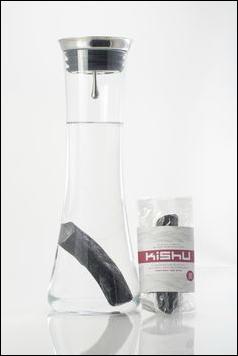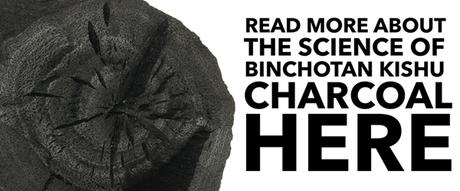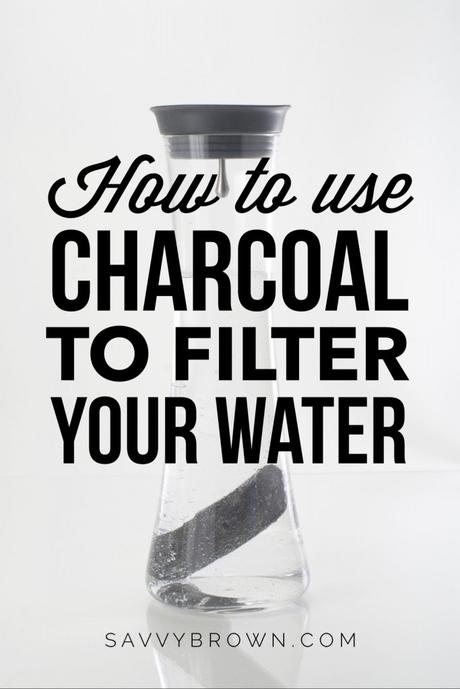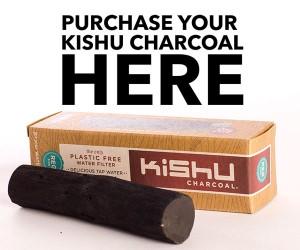My biggest issue with purified water pitchers like Brita and Pur is that although they are made of BPA-free plastic, they don’t make it easy for you to recycle the filters, therefore most consumers just throw them out in the regular trash, which contributes to more non-biodegradable plastic refuse in the environment. Made from a type of birch tree in Japan, Kishu Water Filters are mini “logs” of charcoal that fit into most standard sized pitchers, (I use a glass pitcher like this) and pull impurities out of the water similar to the way the charcoal inside of standard water filters do. I have a friend who swears by them so I decided to investigate.
 Kishu Charcoal – Activated Charcoal Water Filter for Pitchers ($15.49)
Kishu Charcoal – Activated Charcoal Water Filter for Pitchers ($15.49)
What is Kishu Charcoal?
These are not the wood chip charcoal briquettes you use for your grill in the summer. Kishu charcoal sticks are made of Japanese binchotan charcoal and are created by firing oak tree branches in a kiln. (That’s the type of high-temperature oven pottery is fired in). This company sells each branch in four sizes, X-Large 5.5” long version for use in a gallon jug, Regular 5” for 2 quart water pitchers and a handy “to go” 4” smaller thinner size for water bottles and a wittle version for the pet bowl! This Kishu charcoal stick comes “prepared” from the factory so for the initial use you don’t have to soak it like you would a traditional water pitcher filter. However, every month it must be “renewed” by boiling it in a shallow pan of water for 5 minutes and letting it air dry about 15-20 minutes or so before putting it back in the bottle.
How it works
The binchotan kishu charcoal filtering method has actually been used for centuries in Japan and dates back to the Edo period. This type of charcoal is carbonized by the firing process and leaves microscopic cavities in the wood that act like a magnet, attracting toxins like chlorine, lead, and pesticides to itself. The process, adsorption, (not to be confused with absorption) ensures that the toxins remain attached to the wood on a microscopic level and will not leach back into the water. BUT each piece of charcoal does have a saturation point. Which is why it is recommended that you repeat the boiling process every month for sterilization purposes and that you replace the charcoal altogether every four months.

READ MORE ABOUT THE SCIENCE OF BINCHOTAN KISHU CHARCOAL HERE
What I think
I love these things. They’re so easy to use! Just toss it in a glass, ceramic, porcelain or aluminum-free metal container, fill it with water and let the kishu charcoal do it’s thing. Plus, when the charcoal has reached it’s saturation point you can break it up and put it in the bottom of your flower pots or out in your garden to help aerate the soil. You don’t just have to use them in your water either. They are excellent for taking a bath or soaking your feet to pull out impurities, as well as putting in cabinets, drawers and the fridge to keep it smelling fresh (like that box of baking soda you’ve had in there forever). You can also put a couple of pieces in a jar and keep them on a counter or on a shelf as a natural deodorizer. All of the packaging, the box, the instructions and even the sleeve the stick is packaged in are all recyclable as well! And again, NO PLASTIC!
Warning: This charcoal has been prewashed and is not safe for use when cooking with non-potable water. (Basically, this is not the type of filter to use in your water when camping)

SAVVY RATING: 5 Savvy!* – Great product, great ingredients, great price, multi-use!
*Savvy Ratings: 5=Savvy 4=Smart 3=Suitable 2=Satisfactory 1=Stupid

BUY THIS PRODUCT HERE
 Kishu Charcoal – Activated Charcoal Water Filter for Pitchers ($15.49)
Kishu Charcoal – Activated Charcoal Water Filter for Pitchers ($15.49)
